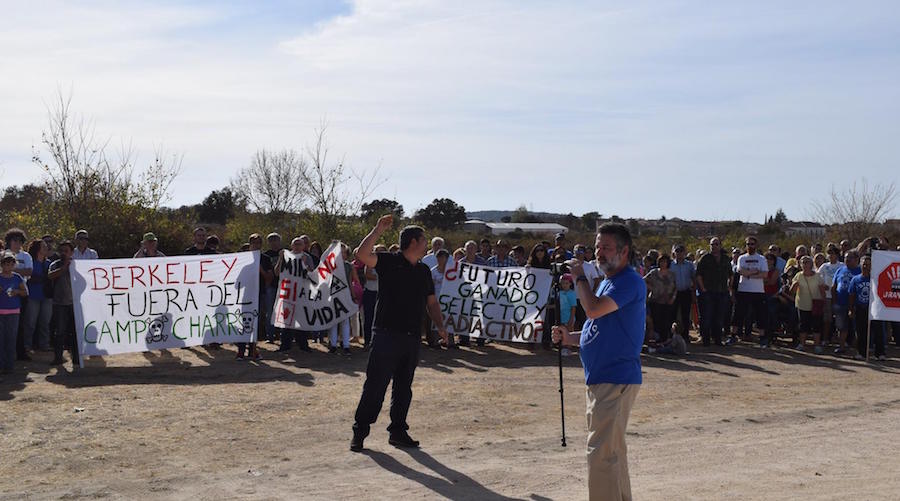Mayor organizes massive protest against Berkeley’s uranium mine in Spain

The mayor of Salamanca’s Villavieja de Yeltes municipality, Jorge Rodríguez, is calling on local residents and people from neighboring towns to attend a rally on November 26, 2017, against Berkeley’s Salamanca uranium project in northwestern Spain.
Salamanca is the London/Salamanca-based miner’s flagship project and is located on the Retortillo-Santidad uranium deposit near the town of Retortillo. The mine is expected to produce an average of 4.4 million pounds of uranium per year, for an initial period of 30 years, renewable for two further periods of 30 years.
It has, however, sparked a wave of opposition from the get-go. Local activists, international organizations, and university experts have continually expressed concerns about the potential impacts of the mine and its nuclear debris on both the environment and the population.
The new protest, backed by the platform Stop Uranio and the Salamanca Antinuclear collective, is expected to gather hundreds, considering that the mayor is planning to rent buses so that people can attend.
According to Rodríguez, almost 40 municipalities are against Berkeley’s plan. Their main concern, he told EFE news agency, is that the mine is located near a school area.
Besides announcing the protest, the mayor also said that he will create a working group whose goal would be to publish a document presenting their studies and perspectives on the Salamanca project.
In response to this story, Berkeley issued an email statement saying:
“The Company enjoys a good relationship with the municipalities of the area and, through the signing of Cooperation Agreements, has provided Wifi networks for local villages, built play areas for children, repaired sewage water plants, upgraded sports facilities, and sponsored various sporting events and local festivals. The residents of Villavieja are overwhelmingly in favour of the mine. The population has fallen 75% to around 400 residents, of which 110 have applied for jobs with Berkeley. The Company is already training and employing many of them and by next year expects to have 80 of them in full-time employment.”
In terms of the environmental concerns, the Australian miner stated that such claims “have been comprehensively rejected by both the courts and the government agencies.” According to the company, its work follows “the world’s highest health, safety and environmental standards and has awards from AENOR, an independent government body, in both Sustainable Mining and Environmental Excellence.”
The comment included a quote from Paul Atherley, Berkeley’s Managing Director, who took notice on the activists opposing the mine: “These opposition groups are part of the stakeholder community that we deal with and by openly addressing any of their legitimate concerns and delivering on our promises, the strong support from the local villagers, the government and the broader community will prevail.”
{{ commodity.name }}
{{ post.title }}
{{ post.date }}





6 Comments
Rob George
Balance? Research? Quotes from Berkeley Energia? Perspective? No, nothing of that here in this “journalism”. Just some free PR for a tiny protest movement, which is actually very unpopular locally. Why are mining.com running such garbage?
Richard Wells
http://www.mining.com/opposition-berkeleys-uranium-mine-spain/
Richard Wells
http://www.mining.com/opposition-berkeleys-uranium-mine-spain/
Nuclear energy experts from a variety of countries expressed their support this week to the actions carried out by Stop Uranio, a social platform that opposes Berkeley Minera España’s plans to open a mine in the Spanish town of Retortillo.
Greenpeace anti-nuclear campaigner, Raquel Montón, said that Spain
doesn’t need nuclear plants or mines because the country is on a
promising path towards developing sustainable sources of clean energy.
Gary
From the left’s point of view, the battle to kill coal is all but done, now it is nuclear power. How the heck is the world going to charge all those electric cars in the future once oil is also on their agenda?
Richard Wells
The Nuclear Industry tries to put a brave face on matters, but almost everywhere it is in tatters with greatly increased costs and a lack of trust by the public. I wonder why? Below follows another extract from the 2017 Industry report. :-
The unique situation in Japan needs to be reflected in
world nuclear statistics. The attitude taken by the IAEA, the Japanese
government, utilities, industry and many research bodies as well as
other governments and organizations, to continue considering the entire
stranded reactor fleet in the country, 10 percent of the world total, as
“in operation” or “operational” remains a misleading distortion of
facts. Steve Kidd, long-time industry strategist, agreed in a World
Nuclear Industry Status Report 2016 (WNISR2016) review in Nuclear Engineering International:
Including reactors as “operable” along
with those definitely in service, when they have not generated power
for many years (and don’t even have a licence to do so) is clearly
ridiculous.21
Villavieja
That’s not true. I live in that village and most of the population is against the mine and most of the population don’t like Berkeley’s lies!